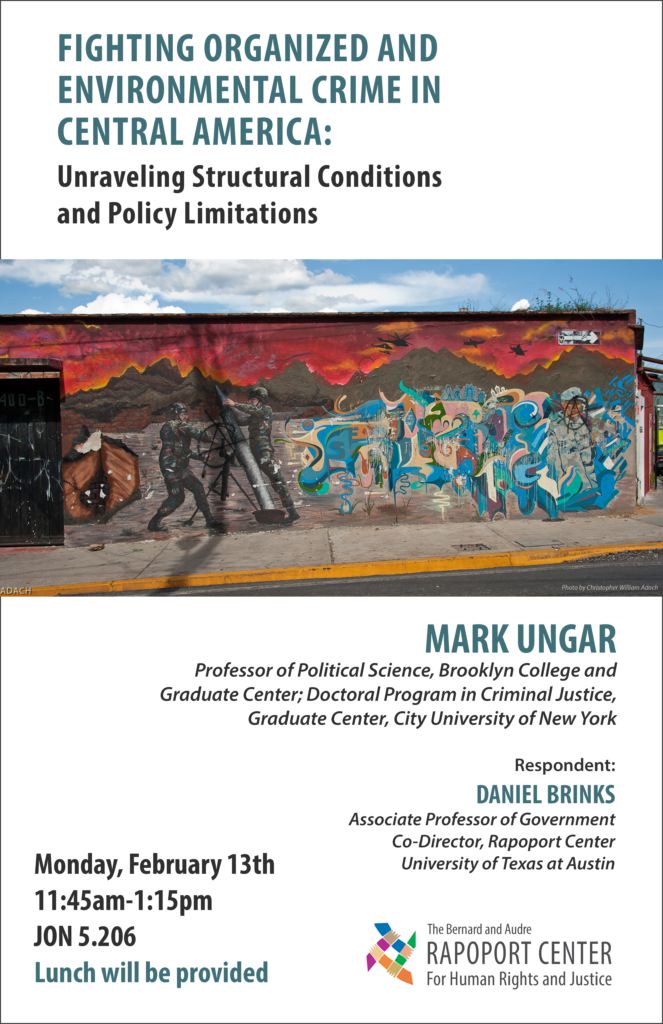
Fighting Organized and Environmental Crime in Central America: Unraveling Structural Conditions and Policy Limitations
- Mark Ungar Professor of Political Science, Brooklyn College and Graduate Center; Doctoral Program in Criminal Justice, Graduate Center, City University of New York
Ungar’s lecture focused on the connection between organized crime and environmental degradation (both “addition” in which hazards and pollutants are added to the atmosphere, and “removal” in which resources are exploited). To understand the situation in Central America’s Northern Triangle region – made up of El Salvador, Honduras, and Guatemala – he began with a high-level discussion on the interactions between state and non-state actors. He noted how these interactions between the state arena of environmental enforcers and policymakers and the non-state arena of organized crime, NGOs and other groups “deepen the problems of environmental and organized crime in the region.”
Ungar described the difficulties in addressing environmental crime given how many organized crime groups in the region actually collaborate with corrupt government officials and divisions. He stated that the ineffectiveness of law and criminal justice, a result of impunity and corruption, has aided organized crime groups in engaging in environmentally degrading activities. Ungar claimed that because many of these issues are interrelated, there needs to be reform aimed at connecting different areas of law.
He noted that all three Northern Triangle countries face environmental challenges, which are exacerbated by the inability of the government to tackle them accordingly. He cited Honduras as an example, where mining activity is frequently protected by government security forces and the Attorney General fails to provide environmental prosecutors with monetary resources sufficient to carry out their tasks. He also mentioned Guatemala, where there are various councils and organizations aimed at protecting the environment and enforcing regulation, but no funding to support them. Although El Salvador has the strongest environmental record in the region, Ungar pointed out that the turnover rate of employees is high, which inhibits the effectiveness of agencies and increasing training costs. And throughout the region, governments often wish to focus on high homicide, femicide, and crime rates before turning to protection of the environment.
Ungar briefly discussed the Amazon Basin region in comparison with the Northern Triangle, as the region represents similar issues on a larger scale and has used more advanced responses to address them. However, he pointed out that these countries continue to face problems of their own.
Ungar suggested myriad responses and solutions that should be or have already been implemented in Central America. He mentioned the use of electronic permits to decrease the potential of fraud and enable officials across the country to look up information immediately, as well as satellite monitoring to help generate information and ensure that areas being mined are in concordance with permits. He also recommended robust databases that enable information sharing and coordination among agencies.
Daniel Brinks, Associate Professor of Government and Co-Director of the Rapoport Center, responded to the talk. Brinks lamented the lack of attention being paid to the environmental aspects of organized crime and noted how the violence experienced by environmental activists in Central America is “very reminiscent” of the political violence that occurred throughout the ’60s and ’70s, only under a new privatized model. “I wonder to what extent we can really think of these democracies as getting stronger and stronger if we have these really massive black holes,” Brinks said.
Respondents
- Daniel Brinks Co-director (2010-2019); Professor of Government and of Law; Chair, Government Department

